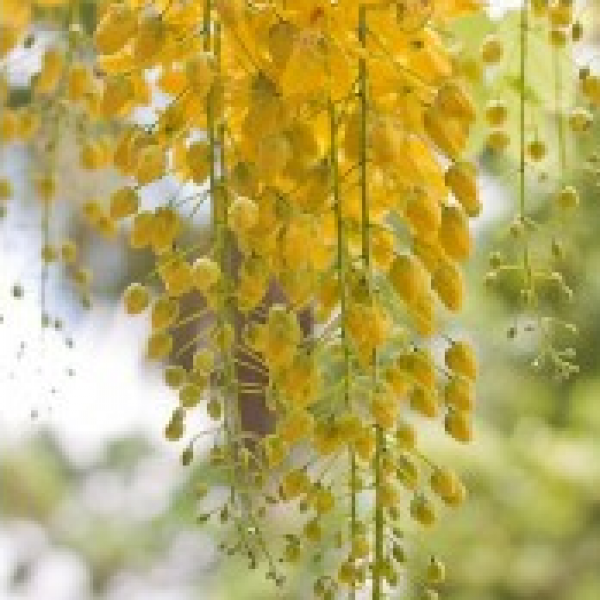This image is for reference purpose only, Photo May Slightly Different From Actual Item in Terms of Color Due to the Lighting During Photo Shooting or the Monitor's Display.
Golden Shower - Cassia Fistula
Cassia Fistula, known as the golden shower tree and by other names, is a flowering plant in the family Fabaceae. The species is native to the Indian subcontinent and adjacent regions of Southeast Asia. It ranges from southern Pakistan eastward throughout India to Myanmar and Thailand and south to Sri Lanka. It is closely associated with the Mullai region of Sangam landscape. It is the national tree of Thailand, and its flower is Thailand's national flower. It is also the state flower of Kerala in India and of immense importance amongst the Malayali population. It is a popular ornamental plant and is also used in herbal medicine.
Description
The golden shower tree is a medium-sized tree, growing to 10–20 m (33–66 ft) tall with fast growth. The leaves are deciduous, 15–60 cm (5.9–23.6 in) long, and pinnate with three to eight pairs of leaflets, each leaflet 7–21 cm (2.8–8.3 in) long and 4–9 cm (1.6–3.5 in) broad. The flowers are produced in pendulous racemes 20–40 cm (7.9–15.7 in) long, each flower 4–7 cm (1.6–2.8 in) diameter with five yellow petals of equal size and shape. The fruit is a legume, 30–60 cm (12–24 in) long and 1.5–2.5 centimetres (0.59–0.98 in) broad, with a pungent odor and containing several seeds. The tree has strong and very durable wood, and has been used to construct "Ahala Kanuwa", a place at Adams Peak, Sri Lanka, which is made of Cassia fistula (ahala, ehela, or aehaela, ඇහැල in Sinhala) heartwood.
Medicinal Plants
In Ayurvedic medicine, the golden shower tree is known as aragvadha, meaning "disease killer". The fruit pulp is considered a purgative, and self-medication or any use without medical supervision is strongly advised against in Ayurvedic texts.
Though its use in herbalism has been attested to for millennia, rather little research has been conducted in modern times. The purgative action is probably due to abundant 1,8-dihydroxyanthraquinone and derivatives thereof. Many Fabaceae are sources of potent entheogens and other psychoactive compounds such as tryptamines; such plants are rarely found among the Caesalpinioideae.
Vernacular names
Amaltās inflorescences, Kolkata, West Bengal, India
Being so conspicuous and widely planted, this tree has a number of common names. In English, it is also known as the golden shower cassia and also as Indian laburnum or golden shower. It is known in Spanish-speaking countries as caña fistula.
Names from its native range and surrounding regions include:
Assamese: xonaru (সোণাৰু)
Bengali: sonalu, bandar lathi, amaltas
Gujarati: garmalo (ગરમાળો)
Hindi: amaltās (अमलतास), bendra lathi (or bandarlauri), dhanbaher (or dhanbohar), girimaloah
Kannada: kakke (ಕಕ್ಕೆ ಮರ)
Marathi: bahava (बहावा)
Malayalam: kanikkonna (or kani konna കണിക്കൊന്ന), Vishu konna(വിഷുക്കൊന്ന) also Ophirpponnu (ഓഫീർപ്പൊന്ന്) or Karnikaram (കർണ്ണികാരം) and Konnappoo (കൊന്നപ്പൂ).
Nepali: amaltash, rajbriksya
Oriya: sunari (ସୁନାରି)
Sanskrit: aragvadha, chaturangula, kritamala, suvarnaka
Tamil: konrai (கொன்றை)
Telugu: raela (రేల)
Golden Shower - Cassia Fistula
- Live plant along with plastic pot
- plants height with pot is 1-2 feet and pot size is 5 icnhes diameter.
- plants nature is outdoor, loves full sun, less watering
- Grows till 30 feet, best landscaping plant and avenue tree
